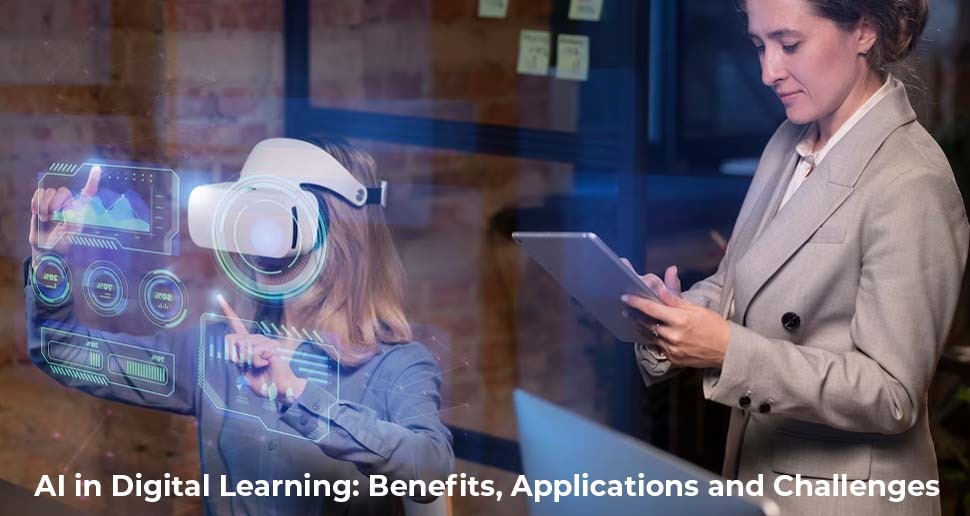AI in Digital Learning: Benefits, Applications and Challenges
Artificial Intelligence is the method of installing manmade brains into robots or computer-controlled mechanoids. AI has a massive hand in the development of the current world. The foremost wave embraced it on the arrival of the viral hero Corona. Recognition of individual data, Time-saving, and consistent feedback raises the aura of AI. Security of data, infrastructure, cost, and upgradation of AI proficiency and skill set constitute the limitations of AI in digital learning. In the current world, we witness different applications that work on AI, providing opportunities for better understanding in diverse fields. The future of AI is aired with the hope of gradual development in AI.
Benefits of AI in Digital Learning
Artificial Intelligence is packed with striking benefits that lure people towards it. The first and foremost benefit of AI in digital learning is identifying individual data or customized learning. Adaptive assessment, which offers questions in easy, moderate, and difficult tests, portrays the adaptability of e-learning and its compatibility. The existence of minute feedback also adds to its glory. The time consumption rate is very low in digital learning compared to ordinary learning methods.
Applications of AI in Digital Learning
Artificial Intelligence holds several tools that have a significant hand on students. The accurate data given by AI and time-saving inspire them to abstract AI into this.
The first evident example of AI learning is the application named ” Microsoft Math Application “. This application understands the mathematical problems from the image, applies equations, and presents the solution with a detailed explanation. The application equips the students to learn quickly and efficiently. Cognii is another application that works on AI. This progressive Natural Language Processing application applies its techniques with chatbots via students. The AI adopted Chatbots to ask questions and deliver feedback on the learners’ performance. The next learning application is Bilppar’s Computer Vision. It performs on the principle of visual learning. The visualization of the theories in the documented study material is virtually represented here. From this, students can easily understand phenomena such as the solar system, volcanic eruptions, and evaporation in 3D form. Duolingo is a prominent language-learning app that utilizes AI for its efficient working. It reviews the user data and gives exercises to improve the learners’ learning experience.
Challenges and Concerns with AI in Digital Learning
Even though AI modifies different fields, there are some limitations in its use. The problem deals with the security of data. The question of security regarding the protection of the personal information of the users seems to be an enormous threat. The second limitation rests upon the replacement of the current AI solution and the installation of a new solution that requires high computational quickness. A healthy infrastructure and high-quality processors are required for this replacement. Assimilation of AI into formerly existing enterprises brought the next picture of impediments. The authorities who are in charge of the matters of governance seek the help of AI specialists to install AI in their mechanisms. Another major challenge in this process of digital learning is its expenditure. The organizers cross-check the benefits and costs of the technology to adopt it. Final provocation marks its way towards the inconsistent AI proficiency and skill set. To get rid of this, companies invest a sum of n AI, employ talents, and purchase power from big IT companies.
Future Trends and Possibilities
The recent world has been witnessing the revolutionary movement of AI that brought reasonable variations in it. The major twists of AI are evident in the field of digital learning. The mechanoids with artificial brains will assist people in various ways. They will replace human beings in hazardous jobs and complicated and mundane tasks. It will encourage people to be more inventive in their minds. The technical expansion of AI will spread its waves in the future through virtualization, the upgradation of brilliance in the industry, and the construction of features with innumerable probabilities.
The Future of AI in Digital Learning
Artificial intelligence is expanding its waves in many ways in the field of e-learning. The adoption of digital learning offers customized learning materials. The algorithms provided by the AI could analyze huge data, recognize the learning style of learners, and give suggestions on their performance. Chatbots, with the spirit of AI and digital associates, alter the way of learning platforms. The AI sources provide high-quality study materials, exercises, and virtual lectures to boost a better understanding of the learners.
The most prominent question of recent times is the existence of human instructors in the presence of AI. Even though the answer seems complicated, we can say that no machines or man-made creatures could have the ability to serve the knowledge with the whole essence of human educators.




